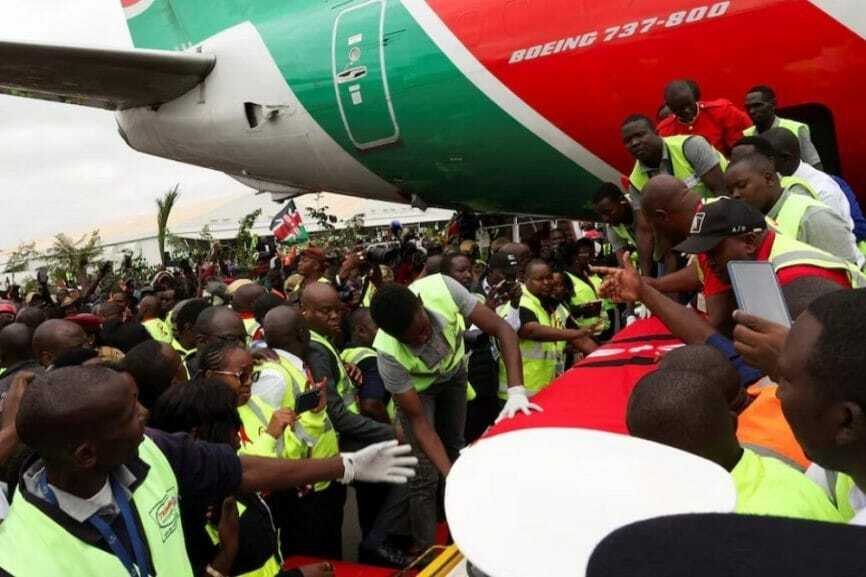Grief and emotion overwhelmed Kenya’s capital on Thursday as thousands of mourners briefly stormed the Jomo Kenyatta International Airport to receive the body of the late opposition leader and former Prime Minister, Raila Amolo Odinga.Odinga, 80, passed away on Wednesday while undergoing treatment in India, marking the end of an era for one of Kenya’s most enduring and transformative political figures.
His death sent shockwaves across the nation and the wider East African region, where he had long been seen as a symbol of democracy, reform, and resistance against authoritarian rule. What was intended to be a solemn military reception quickly turned into a chaotic scene. As Odinga’s flag-draped coffin was being offloaded from the Kenya Airways cargo hold, throngs of mourners—many waving twigs, flags, and portraits of “Baba,” as Odinga was affectionately known—pushed past security barriers.Witnesses described an overwhelming wave of emotion as supporters sang liberation songs, chanted his name, and cried openly. Some mourners rode motorbikes across the tarmac, while others climbed fences in an attempt to get closer to the plane.The unanticipated surge forced authorities to suspend airport operations for nearly two hours, as security personnel struggled to restore order. President William Ruto, several cabinet members, and senior opposition leaders—who had gathered to receive Odinga’s remains with full military honors—were temporarily escorted away for safety.
Later in the afternoon, Odinga’s body was transported under tight security to a Nairobi sports stadium, after earlier plans to display it at the national parliament were abandoned due to crowd control concerns.By the time the cortege reached the stadium, tens of thousands had already gathered—many draped in the colors of Odinga’s Orange Democratic Movement (ODM) party. Emotional chants of “Baba! Baba!” filled the air, mingled with the sound of church choirs and traditional Luo dirges.Among the mourners were young Kenyans who had only known Odinga as a national figure through their parents’ stories or television broadcasts.
“He fought tirelessly for multi-party democracy, and we are enjoying those freedoms today because of his struggle,” said Felix Ambani Uneck, a university student who had traveled from Kisumu.
“It means more people, especially us who followed him from a distance, can finally say goodbye to Baba in a place that represents the people he loved,” added Khahija Dennis, 30, from Nairobi.
Raila Odinga’s political career spanned over four decades. The son of Kenya’s first vice president, Jaramogi Oginga Odinga, Raila was both a political heir and a revolutionary. He spent years in detention under the repressive regime of former President Daniel arap Moi for championing democracy and constitutional reforms.
He played a central role in the restoration of multi-party politics in the early 1990s and became a rallying point for opposition movements across the country. Despite contesting five presidential elections—each ending in defeat amid claims of electoral malpractice—Odinga never relinquished his commitment to democratic ideals.
In 2008, following a disputed election that plunged Kenya into post-election violence, Odinga entered into a power-sharing agreement and served as Prime Minister under President Mwai Kibaki. His ability to bridge divides and negotiate peace earned him respect even among rivals.Last year, he shocked many by striking a political truce with President Ruto, signaling a final act of statesmanship that underscored his lifelong dedication to national unity.
Even as Kenya unites in grief, tensions briefly flared at the stadium when a government vehicle accidentally struck a mourner, prompting some in the crowd to throw stones before calm was quickly restored.Police have since increased security around key venues, with officials urging the public to observe peaceful mourning in the days leading up to the official state funeral.
For millions, Raila Odinga was more than a politician—he was a movement. His resilience, fiery rhetoric, and unwavering advocacy for justice won him both admiration and controversy in equal measure.As the sun set over Nairobi on Thursday evening, candles lit up the city streets in spontaneous vigils. From Kisumu to Mombasa, Kenyans gathered to sing and pray, celebrating a life that shaped the nation’s democratic identity.Odinga’s funeral is expected to be one of the largest in Kenyan history, with world leaders, dignitaries, and thousands of citizens set to attend.
“Raila was the voice of the voiceless, the hope of the oppressed,” said Achieng Ouma, a 64-year-old retired teacher from Siaya County. “He may be gone, but his dream of a better Kenya will never die.”
As Kenya bids farewell to one of its most iconic sons, the message is clear: Raila Odinga’s legacy will continue to inspire future generations—long after his body has been laid to rest.
